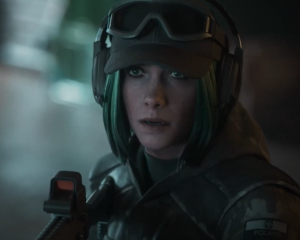
On the living room TV, virtual versions of Jan Burguieres and her 20-something daughters Ally, Elizabeth and Tory are playing baseball via the Nintendo system atop the set.
It used to be that this all-woman crew wouldn't fit the standard image of the video game consumer.
But the perception of gamers as being mostly young guys isn't so true anymore.
Women and girls make up 40% of the gamer population, according to the Entertainment Software Association, the video game industry's trade group.
And with game software sales at $9.5 billion last year, companies are paying closer attention to the titles women seek out.
The Burguieres sisters grew up playing video games.
Ally, a 25-year-old graduate student, says she sometimes felt shut out as a kid when boys started to play or talk about video games.
She says that a situation may now have changed, thanks to the widespread appeal of the Wii and music games such as Guitar Hero.
"Women are now being treated as natural members of the gaming community," she says.
"In my generation and before, I don't think girls felt accepted in that community."
For years, the video game industry spent its marketing dollars trying to get guys excited about the latest sports or shoot-'em-up title.
It was generally assumed that women and girls weren't interested.
But that started to change in 2004, says industry analyst Michael Pachter, when Nintendo launched its DS portable game system, named for its dual screens.
Its features stretched the notion of what a video game is - and who might want to play.
In one early DS game, players took control of a virtual puppy.
To pet the dog, players rubbed the touch-sensitive screen; to train the dog to sit, players spoke into the device's built-in microphone.
Compared with many games that expected a mastery of the controller buttons, the interface was intuitive.
Nintendogs was a hit with both sexes and suggested to many in the industry that it might be time to take note of games that appeal to a wider audience.
Today, half of DS users are female, according to Nintendo.
Helene Juguet, senior director of marketing at Ubisoft, says the company is still learning how best to appeal to girls.
She believes that one day the distinctions between what the company offers as "girl" games and the rest of its titles will fade.
"Eventually, as video games become a medium that is more accepted, the difference will go away," she says.
"It won't be a matter of there being a genre that is popular with one gender or another."
Some girls and women are already picking up the game controller and trying out titles that are usually thought of as strictly for guys.
Gabriel Ralte, a 28-year-old nursing student from India, says she likes to play Grand Theft Auto IV to unwind and do things she wouldn't try in the real world.
Ralte had never played video games before coming to the United States, but her boyfriend is a gamer, so she decided to give his Xbox 360 a try.
She thought a tennis game he bought for her was pretty good, but she loves GTA.
She's now further along in the game than he is.
Virtual-world games have always had a larger share of women players than other games, says Yvette Nash, who works as an international producer at game studio EA Mythic.
That is probably because they are often as much about collaborating as a team, or just hanging out, as they are about going on adventures.
One of the final frontiers for women and gaming might be competitive online action games in which players try to blow up, or "frag," their adversaries.
The tone of the trash talking in these games can scathe even the most thick-skinned player, guy or gal.
So Microsoft, with its Xbox 360, has started a club where women can play together online, away from the testosterone-fuelled chatter that is common in matches for action games. - Mike Musgrove












